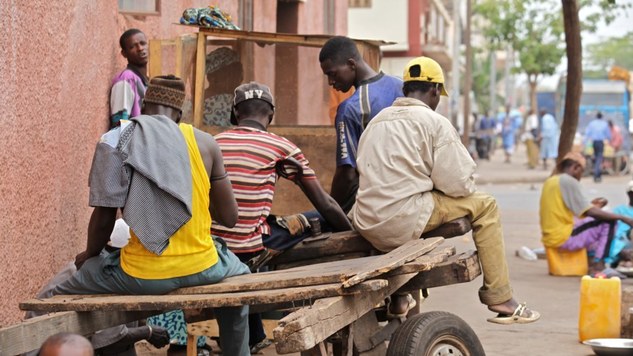 |
| Young men arrested as terror suspects in Kenya |
Radicalization of Kenyan youth is reaching alarming proportions. What is fretting us is the ability of Al-Shabaab to reach out to non-Somalis and non-Muslims and recruit them with ease. It is clear that Al-Shabaab is specifically targeting young people who are angry with the country. Al-Shabaab and other violent groups are exploiting our vulnerabilities to recruit the young people.
60% of Kenya’s population is under the age of 30
75% of Kenya’s out-of-school youth are unemployed
UNEMPLOYMENT
Our job market can only absorb one out of five graduates,
meaning the educated youth have either to be self-employed, stay at home, or
roam streets looking for dream jobs. And we are not even talking about those
who drop out of primary and secondary schools. It’s understandable why some of
them end up in the criminal world.
One obvious fact is that these violent groups are mainly
composed of the unemployed or unemployable youth who were voluntarily or
selectively recruited. They are frustrated, marginalized and alienated from
mainstream society. Many feel their hopes and chances in life have been taken
away from them. Misery and hardship are their way of life.
 |
| Idle youth with no jobs |
POVERTY, SURVIVAL, BROKEN HOMES
Deepening poverty ferments social discontent that turns
our frustrated youth into a mass underclass vulnerable to radical ideas. Their
misery and abject conditions are easily tapped into by Al-Shabaab and similar
groups. It becomes very easy to mobilize these young people and send them to
commit violent acts.
Terrorism and other heinous crimes committed in the
country can also be seen as protests against society, an alternative means of
survival and a form of employment. The youth are not only easy to recruit and
train but also easy to indoctrinate with radical ideas. This could be
attributed to social vulnerability as in absentee parents, erosion of social
control, and high levels of delinquencies in families.
With broken and dysfunctional homes in urban slums where
the state has practically withdrawn, terrorist and violent groups easily move
in to fill the void and recruit the vulnerable youth.
EDUCATION
Too many students are dropping out of school and cannot,
therefore, find gainful employment. Universities and colleges are producing
unmarketable and ill-trained graduates uncompetitive in the job market. Their
curricula do not focus on the fundamentals of knowledge, skills, and values. The
knowledge supposedly being imparted to students in tertiary institutions is
irrelevant to our economic and social needs. Our educational institutions
specialize in teaching students how to pass examinations but not how to
productively survive in a primitive accumulative society like ours.
These schools, colleges and universities must change and
imbue our young people with values of patriotism, train them in innovation,
creativity and self-reliance. If that happens, their graduates would not be a
burden to society and a danger to the nation.
IDEOLOGY
Religion provides these youth with a shared identity
which they use as a driver to seek justice or to redress many of their
grievances. Their motivation is not revenge-seeking. Despite their poor
backgrounds, they are not driven by greed. They have issues with the government
policies - both domestic and foreign.
Evidence shows that radicalized Kenyan youth are driven
by a complex matrix of ideology, identity and personal motivations like hate
and prestige. The government has also contributed to the flourishing of youth
grievances by abetting corruption and tribalism.
The government aggravates the problem when it criminalizes
youth grievances. The use of heavy-handed approaches to silence the young
people is easily exploited by groups like Al-Shabaab to recruit new members.
 |
| "Pwani si Kenya" (the coast is not Kenya) |
Government responses to terrorism have inadvertently
assisted these groups to indoctrinate and recruit the youth by portraying the
state as an instrument of brutality targeting their identities. This provides
an entry point for alienated and opportunistic elites to pursue their hidden
agenda to be incorporated in government, gain political power or worse, to
promote secession through chants like “Pwani si Kenya’’ (the coast is not Kenya).
State weakness and fragility also generates inequalities,
mass social discontent and alienation, militarization of security agencies,
extra-constitutional actions, deep identity divisions and inability to provide
public services and goods.
As the state loses its capacity to provide public goods
and services to most citizens, grievances increase and find avenues for
articulation through outfits such as the Mombasa Republican Council. Our youth
are driven by “righteous indignation” and anger displayed in their atrocious
violent acts.
RELIGION AND RADICALIZATION
Schools and places of worship are used to radicalize and recruit
the youth. The radicalization program includes inculcating the youth with
outrage, resentment, defiance, subversion, and resistance. They are encouraged
to use violence to express their dissatisfaction and frustration, exert their
power, seek attention, search for recognition and identity and challenge or
embarrass the government.
While religion per se does not radicalize the youth, it
constitutes a framework for interpreting their prevailing conditions and
realities. It also provides justification of what is acceptable and allowed or
what is forbidden and denigrated. Religious and ritualistic practices are
usually used in recruiting, training, and deploying the youth into action. While
some youth don fetishes and religious symbols, others invoke scriptures while
carrying out attacks.
CONCLUSION
Unless we do away with conditions that alienate our
youth, Al-Shabaab and other criminal groups will continue to recruit from our
slums, streets, villages, schools, and dysfunctional homes.

No comments:
Post a Comment